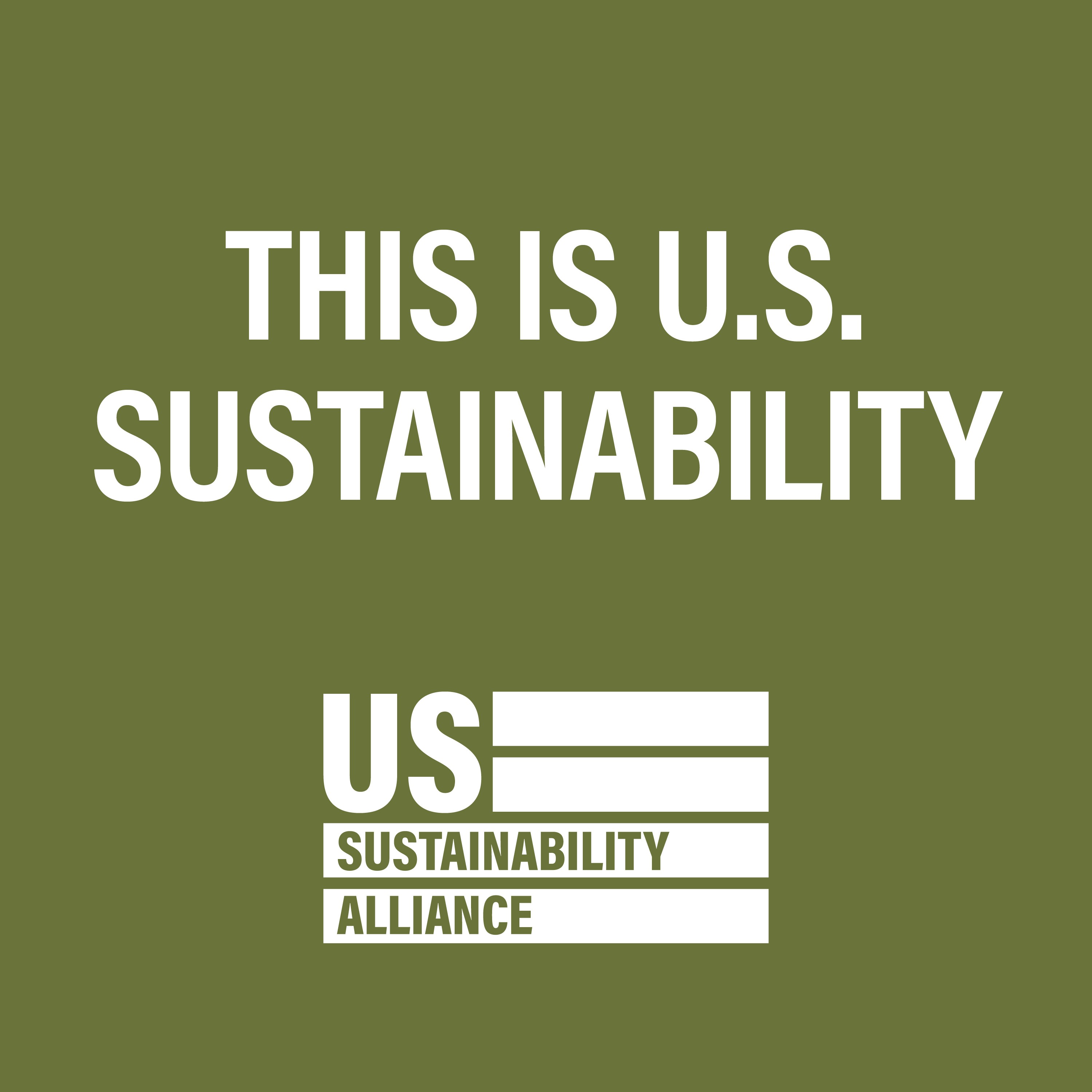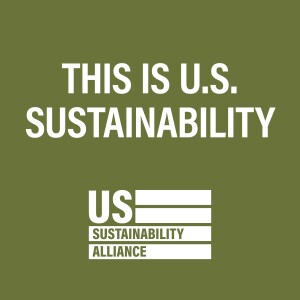
Want to know what’s really going on in U.S. farming and food production? Tune in to ‘This Is U.S. Sustainability‘ where we debunk some of the most common myths and misperceptions by talking to the people who know best. Hear from the farmers and fishermen responsible for growing and catching our food, from the cotton fields of Louisiana to Alaska’s Glacier Bay. And get the inside track on topical issues including animal welfare, water conservation, and the role of tech and innovation in feeding a growing world. To carry on the conversation on social media, use #USSApodcast
Want to know what’s really going on in U.S. farming and food production? Tune in to ‘This Is U.S. Sustainability‘ where we debunk some of the most common myths and misperceptions by talking to the people who know best. Hear from the farmers and fishermen responsible for growing and catching our food, from the cotton fields of Louisiana to Alaska’s Glacier Bay. And get the inside track on topical issues including animal welfare, water conservation, and the role of tech and innovation in feeding a growing world. To carry on the conversation on social media, use #USSApodcast
Episodes

Wednesday Aug 16, 2023
E12: U.S. sustainable agriculture is a family affair
Wednesday Aug 16, 2023
Wednesday Aug 16, 2023
Welcome to the final installment of our podcast series recorded in Louisiana. In this episode, we speak to two farming families, reflect on the highlights of our trip, and discuss regenerative agriculture, black bears, the environmental benefits of cotton tighty-whities, and more.
Join us as we visit a multi-crop farm near the Mississippi River in Morganza which has recently opened its doors to tourists. Matt and Marty Frey and their families grow soybeans, rice, and sugarcane, raise cattle, produce hay, and harvest crawfish. We chat with them about what it takes to run a 365-day-a-year operation. We also catch up with Marshall and Mead Hardwick, fourth-generation soybean and cotton farmers from Newellton, northeast Louisiana. We interviewed the brothers and their dad for our launch episode, so it was a pleasure to catch up with them and hear about their regenerative cotton partnership with a top fashion brand.
Tune in now for sustainability insights from two families on the frontline of Louisiana agriculture.

Tuesday Jul 25, 2023
E11: Adapting to climate change - coastal protection in Louisiana
Tuesday Jul 25, 2023
Tuesday Jul 25, 2023
12-minute listen
Louisiana’s coastal wetlands, which cover approximately 11% of the state, are under threat. Natural and manmade factors have already claimed vast swathes of the coastline, and scientific models predict that even a moderate land loss scenario over the next 50 years could put an additional 2,250 square miles at risk.
The good news is that work is already underway to adapt and preserve Louisiana’s coast in the face of future environmental change. In the latest episode of This is U.S. Sustainability, we travel to the Center for River Studies in Baton Rouge to meet the organization spearheading the efforts. Join us as we speak with Greg Grandy, Deputy Executive Director of the Coastal Protection and Restoration Authority, and learn about some of the agency’s pioneering projects.

Tuesday Jun 27, 2023
E10: Putting research and innovation in the hands of farmers
Tuesday Jun 27, 2023
Tuesday Jun 27, 2023
The United States is proud of its land grant universities which provide vital research-based resources to their local communities on various topics, from agriculture and natural resources to personal finance and youth education.
In the latest episode of This is U.S. Sustainability, we look at the special relationship between academia and agriculture and how it drives innovation, using the example of the Louisiana rice industry. Join us as we head south to the world-renowned Rice Research Station near Crowley, where researchers have boosted the sustainability, nutritional value, quality, and profitability of the state’s top grain crop for over a century. We also meet fifth-generation farmers Paul and Fred Zaunbrecher in nearby Rayne to hear how the Station’s work has benefitted their rice and crawfish operation. Tune in for the latest developments in Louisiana rice and crawfish production, and soak up the atmosphere on the farm.

Wednesday May 24, 2023
E9: A taste of Louisiana agriculture and trade: from crawfish to sugarcane
Wednesday May 24, 2023
Wednesday May 24, 2023
Louisiana is famous for many things – its Creole cuisine, bayous, alligators, and jazz scene are legendary. But, unbeknown to many, the state is also an agricultural powerhouse, the premier gateway for U.S. exports, and a hub for research and innovation.
In this, the first of four episodes recorded on location, we share the story of sustainable Louisiana agriculture and trade, from the cotton fields and sugarcane rows to the crawfish ponds and the mighty Mississippi.
To set the scene, we chat with Dr. Mike Strain, Commissioner of the Louisiana Department of Agriculture and Forestry, about the Port of Greater Baton Rouge, America’s economic superhighway, and its pivotal role in agricultural trade. We hear how it continues to evolve and rise to the challenge of climate change, much like Louisiana’s farmers who adapt and use the best available tools to protect their land for future generations. We also hear from USSA’s David Green, who gives his perspective on USSA’s Louisiana tour.
Tune in now for a flavor of Louisiana and a unique insight into our experience visiting the state.

Saturday Dec 24, 2022
E8: Farming Heritage: respecting tradition, embracing change
Saturday Dec 24, 2022
Saturday Dec 24, 2022
In the United States, around 98 percent of farms are family owned and operated. And many of these farmers want to continue their family tradition by handing down their operation in better shape to the next generation. That takes hard work, dedication, and a continuous focus on doing what’s best for the land and the business.
In the latest episode of This is U.S. Sustainability, we hear from two multi-generational farmers – an eleventh-generation grains farmer from Maryland and the owner of a centennial cattle farm in Louisiana – about how they have moved with the times while staying true to their roots.
We cover rotational grazing, no-till cultivation, water conservation, biotech seeds, and more. And we discuss why going back to the natural cycle is sometimes the best approach.

Wednesday Nov 30, 2022
E7: Forests and their role as a natural climate solution
Wednesday Nov 30, 2022
Wednesday Nov 30, 2022
When it comes to capturing and storing carbon, there is nothing better on land than forests, says Professor Tony D’Amato, a silviculture expert from the University of Vermont and guest on This is U.S. Sustainability. The challenge is ensuring that forests stay as forests, he adds.
According to Paul Catanzaro, a professor and state extension forester from the University of Massachusetts, the issue is compounded by an aging demographic of private landowners who own around 70% of forests in New England. “The decisions that these current landowners make about what will happen to their land when they pass away will largely shape the public benefits that we receive in the future,” he says.
Tune in to the latest episode of This is U.S. Sustainability to hear how Paul and Tony work together to reach family forest owners and ensure they have the information and resources to make the right decisions about their land. And learn about the vital role Tim Stout, a Vermont landowner, plays in amplifying their message.

Monday Oct 31, 2022
Monday Oct 31, 2022
Did you know that if food waste were a country, it would be the third largest emitter of greenhouse gases in the world, or that a significant amount of food is lost before it leaves the farm? In this episode, we take a closer look at how the U.S. food supply chain is reducing, upcycling, re-using, and eliminating food and postharvest waste.
We speak to Dr. Josette Lewis, Chief Scientific Officer at the Almond Board of California about the almond industry's research into new, productive uses for those parts of the plant that might otherwise be thrown away, such as the hulls, the shells, and even the orchards themselves at their end of life. Jet fuel, beer, water filters, and peat moss to grow mushrooms – these are just some of the many applications in use and under development, as U.S. Department of Agriculture research leader Bill Orts explains.
Also, in this episode, we chat with food scientist Maddison Gurrola about how a leading brewer is upcycling spent brewer’s grain into novel ingredients. And we hear from founder Molly Morse whose start-up is transforming methane gas into a biodegradable polymer that’s a replacement for conventional plastics.

Wednesday Dec 22, 2021
E5: Soil Health, featuring a soil scientist, a cotton farmer and an organic farmer
Wednesday Dec 22, 2021
Wednesday Dec 22, 2021
What is soil heath? Why is it important? And how can it be improved? Tune in to the latest episode of This is U.S. Sustainability to find out.
We speak to Professor Michelle Wander, a soil scientist at the University of Illinois whose entire career has been dedicated to understanding soil stewardship, and we hear from two award-winning farmers:
Cotton farmer Barry Evans, Field to Market’s Farmer of the Year
A third-generation cotton grower in the Texas panhandle, the heart of America’s historic Dust Bowl, Barry has experienced the dangers of blowing topsoil first hand. He shares his resilient approach to dryland farming and how he rises to the dual challenges of water and wind erosion of his soil.
Organic farmer Amy Bruch, The Organic Trade Association’s Organic Farmer of the Year
A follower of the Albrecht Kinsey principles of soil fertility, Amy is credited with evolving her family operation in York County, Nebraska into one of the most cutting-edge organic farms in the country. She talks to us about intentional soil balancing and how, by feeding the soil, she’s feeding the plants and achieving optimal yields.

Tuesday Nov 23, 2021
E4: A deep dive into water conservation
Tuesday Nov 23, 2021
Tuesday Nov 23, 2021
In this episode, we take a deep dive into the issue of water conservation.
We travel from Weiner, Arkansas to the central valley of California to find out how some of America’s farmers are rising to the challenge of climate change and extreme weather by implementing water efficiency measures on their land.
We speak to an Arkansas rice farmer who describes his approach to irrigation as a giant mathematical equation and hear from a California almond grower who says that the biggest dilemma she faces is how to harness the rain when it comes.
Tune in now to hear more about the intricacies of multi-inlet rice irrigation, the benefits of whole orchard recycling, and how groundwater banking could be the future.
If you enjoy what you hear, please do give us a like and leave us a positive review!

Tuesday Oct 26, 2021
E3: Technology and Innovation, from GMOs to precision agriculture
Tuesday Oct 26, 2021
Tuesday Oct 26, 2021
Technology and innovation go under the microscope as we consider the differing approaches between the U.S. and Europe and how technology could play a major role in sustainable food production. We talk GMOs, the cost benefits of variable rate technologies and how farmers everywhere want access to the best tools but sometimes politics stand in the way.
Tune in now to hear from guests including:
· Monte Petersen, a soybean farmer from North Dakota and a strong advocate for GMOs
· Peter Hvidsten, a wheat farmer from Northwest Minnesota who uses several practices including variable rate application
· Benno van der Laan, a public affairs expert who has more than 25 years’ experience in international market access issues associated with agricultural technologies
· Marie-Cécile Damave, Head of Innovation and International Affairs at agricultural think tank Agridées
